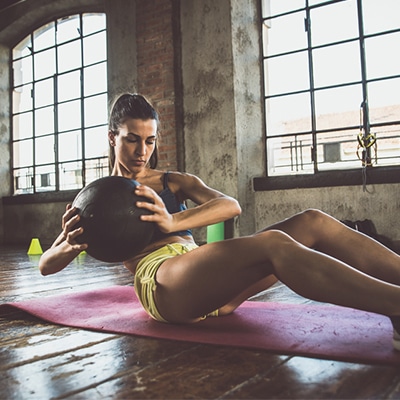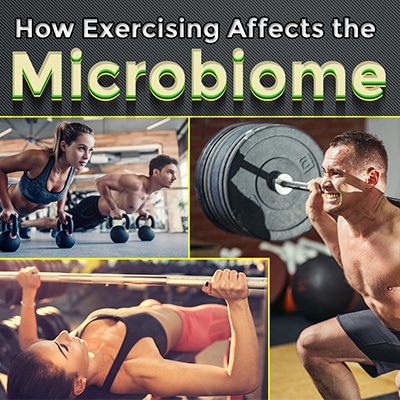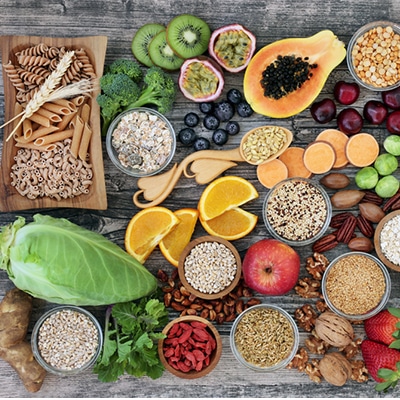How Exercising Affects the Microbiome
If this holiday season had more cheer than you are willing to admit, you may have lingering belly fat that you want to get rid of. — FAST!
Should you go to the gym?
Or maybe for a walk?
Everyone seems to be trying CrossFit, should you start there?
Are these things you’ve been wondering about lately?
You might be hesitant to begin any type of exercise if you suffer from any form of dysbiosis.
Who wouldn’t be?
You’re nervous about having to stop mid-workout to run to the bathroom.
What if you’re on a walk and you aren’t anywhere near a bathroom? It makes exercising sound like the worst idea ever, right?
You may find that your symptoms get worse after certain workouts. Is exercise even good for IBS, IBD, or any other common gut issues?
You’ll be extremely interested to find out what research has to say.
Is Exercise Good for Gut Health?
First things first, this isn’t a black and white answer.
Like most things in the healthcare industry — and everything else in life — exercising for your gut health is fairly controversial.
So don’t get too excited quite yet.
This is not your free pass to get out of gym class, my friend. Just because it is controversial doesn’t mean you don’t have to exercise.
Basically what it will come down to is what type of exercise you plan on doing and what gut health issues you have — if any.
Basics of the Microbiome
Our microbiome is a world of bacteria and microorganisms that live inside of our gut.
Don’t freak out!
The bacteria that live inside our tummies are actually really good for us — as long as they stay there.
In a healthy microbiome, you have trillions of bacteria and they’re all balanced out and do their jobs.
Bacteroidetes and Firmicutes are the two most common groups.
Bacteroidetes: are like a German Shepherd for your gut, it fiercely protects everything where it lives (the gut), but if it escapes and goes where it is unfamiliar (anywhere outside the gut) it can attack good cells and cause major body dysfunction.
Some positive effects that bacteroidetes carry are:
- Help fight fat and cravings
- Take an inventory of nutrients in your body and dispense them accordingly based on how readily-available they are
- Help to get rid of toxic substances the gut
- Can control the immune system to help fight unwanted or bad bacteria
- Help with carbohydrate fermentation which turns carbohydrates that are normally harder to break down into short chain fatty acids (SCFA)
Firmicutes: there isn’t quite as much research on the jobs of these bacteria.
It is known that they work hand in hand with bacteroidetes and can have similar benefits, but definitely, do have other qualities to them.
Some of the ways they differ include:
- May cause you to crave sugar
- Have been found in higher quantities in obese patients
- Levels of Firmicutes can lower after Caloric Restriction (CR)
How is Exercise Beneficial for My Microbiome?

We have always heard that exercise is good for us — especially when it comes to losing weight.
Low-intensity exercises are the way to go for helping out your gut health.
This is especially true for those who are suffering from any gut problems.
Research in animal studies has shown that after low-intensity exercise, the microflora changes and becomes richer in diversity.
This is a really good thing when it comes to your gut health.
The more types of microflora you contain in your gut, the healthier your microbiome is.
These same studies also showed that regardless of diet, the microflora became richer and more diverse by having a more active lifestyle.
So how does that work exactly?
How does running around for a while make different bacteria grow better in my stomach?
When you exercise, your blood starts flowing better.
Your blood is a transport system for your nutrients and it carries them from one area to another so they can be used properly.
Your blood also circulates oxygen.
This is extremely important because oxygen helps to fight oxidative stress (free radicals). Oxidative stress is a major component in many disorders.
Some studies have come out saying that oxidative stress causes a reduction in antioxidants that your body would naturally make on its own.
The Superheroes of Your Gut
Remember those Bacteroidetes and Firmicutes mentioned above?
These guys have HUGE impacts on how efficiently your body not only digests food but how the nutrients are used as well.
When Bacteroidetes ferment your carbohydrates they turn them into short-chain fatty acids (SCFAs).
This makes your body able to absorb them properly without exerting too much energy.
One of the most important SCFAs is butyrate.
Butyrate has been shown to help in the prevention of colon cancers and inflammation. Butyrate also helps conditions like obesity, cystic fibrosis, sickle cell disease, and many others.
Exercise does seem to have different effects on the microbiomes of those who are obese versus those who are lean.
Obese subjects naturally have a higher level of Firmicutes to Bacteroidetes. This makes obese patients crave more sugar and not be able to use the SCFAs as effectively.
Those who are predisposed to obesity by heredity show this same pattern.
However, levels can be switched by starting a caloric restriction (CR) diet (This should always be discussed with a doctor before being done).
How Can Exercise Harm My Microbiome
High-intensity workouts seem to have the most negative effects on the wonderful world of your gut.
A study was done on military personnel during a long hike through the snow.
Most of the participants complained of stomach problems — stomach cramping, diarrhea or constipation.
After stool samples were collected, it was determined that strenuous exercise with limited food resources has major negative effects on the microbiome and brain.
More studies will be done in the future to see if a pre-consumption period of certain macronutrients helps to sustain gut health through strenuous activities of military personnel.
Intestinal permeability (IP) appeared to be the biggest issue for people in this study.
IP means that the mucosal lining is allowing more substances to pass through than it should. It’s like a teacher who isn’t paying attention to the little kids in their class.
They aren’t forced to stay inside the classroom so they are able to freely roam where they really shouldn’t be.
IP is responsible for your body not being able to reabsorb nutrients that are essential for your gut and overall health.
Another study showed that professional athletes tend to have higher rates of heartburn and diarrhea.
While most would chock those down to being dictated by their nerves it is more likely to be an imbalance in their microflora from the intensity of their training and competitions.
So while exercise can be good for the microbiome, high-intensity exercise may have the opposite effect on just how healthy your gut bacteria actually are.
How Exercise Can Affect Different Gut Conditions
Irritable Bowel Syndrome (IBS) –
- Patients have nearly double the Firmicute ratio to Bacteroidetes
- Light exercise may help to balance these levels leading to less difficult symptoms of IBS
- Findings of SCFAs in fecal samples are higher in those who suffer from IBS which means they aren’t being reabsorbed into the body to be used properly (studies have not been able to indicate if this is a cause or symptom at this time)
Colitis –
- Voluntary exercise has different effects than forced exercise
- Typically voluntary exercise had better results on symptoms
- Forced exercise actually made for a richer diversity in stool samples of this study
- Daily exercise for set amounts of time may have better results in the diversity of gut flora
Colon Cancer –
- Risks can be reduced by up to 50% with light exercise
- Higher Butyrate levels help protect the body from carcinogenesis (generation and growth of cancer cells) in the colon
Myalgic Encephalomyelitis/Chronic Fatigue Syndrome (ME/CFS) –
- This is one of the few cases where even light exercise can make gut symptoms worse
- Consulting with your healthcare provider can help you get on the right treatment path
- If you suffer from either of these and gut health problems, exercise may not be for you
Obesity –
- Obesity can lower cognitive abilities and increase anxiety
- Exercise appears to help with increasing cognition but doesn’t do much for anxiety
- It is often recommended to do food restriction along with exercise, but in this research, it may be proven that using both of these methods simultaneously can cause an imbalance in gut flora and the mucosal barrier (choosing one or the other might be the best option to maintain good gut health)
- Different obesity statuses can determine better results with exercising for gut health
Keeping Your Gut Healthy While Exercising
Polyphenols have been shown to help decrease inflammation.
Taking a polyphenol supplement while exercising can not only assist you in a more beneficial workout, but it can also help to nourish the bacteria in your microbiome as well.
Eating foods or taking supplements full of antioxidants can help balance out the effects that oxidative stress can normally have on your body.
Dietary fiber helps protect your digestive tract with antioxidants. You can find dietary fiber in coffee beans, cabbage, and many other foods that we typically consume in a healthy diet.
Atrantil is a great source of both polyphenols and antioxidants to take while exercising and caring for your gut health.
Is Exercise Good or Bad For Your Microbiome?
Gut health is definitely affected by exercise.
Lower-intensity exercises are better for the health of your gut.
Some high-intensity workouts can actually be damaging to gut health and diversity of bacteria in the gut.
If you are planning on starting a new workout regiment start low and slow and work your way up.
Always check with your doctor before starting any new exercise or diet regimen.
This article is for purely factual purposes and not to be used instead of advice from your primary care physician.
Check in with your body from time to time and see how your gut health seems to feel. Your body will let you know if you are doing too much or too little and your stools will reflect that.
Have you noticed differences in your gut health after exercising?
Let us know your experiences in the comments section below!
https://www.ncbi.nlm.nih.gov/pmc/articles/PMC2176045/
https://www.ncbi.nlm.nih.gov/pmc/articles/PMC5357536/
https://www.ncbi.nlm.nih.gov/pmc/articles/PMC3070119/
https://www.ncbi.nlm.nih.gov/pubmed/29166320
https://www.ncbi.nlm.nih.gov/pubmed/28336545
https://www.ncbi.nlm.nih.gov/pmc/articles/PMC4253991/
https://www.ncbi.nlm.nih.gov/pmc/articles/PMC1760153/
https://www.ncbi.nlm.nih.gov/pubmed/25678701
https://www.ncbi.nlm.nih.gov/pmc/articles/PMC4277013/


Please provide examples of low intensity vs high intensity exercise.
Hi Ginger,
Thank you for your question. Low intensity and high intensity exercise is really different for everyone.
To figure out what exercise intensity is for you, you need to know your maximum heart rate (MHR). You can estimate your MHR by subtracting your age from 220. Low-intensity exercise is exercise that gets you to about 40 to 50 percent of your MHR. Your MHR during a high-intensity workout is 70 to 85 percent.
A good way to estimate this is with the Talk Test. If you can talk and carry on a conversation while exercising without running out of breath, you’re exercising at a low intensity.
However, if you can’t say any more than a few words without having to pause to breathe, then you are probably at high intensity. We hope this helps to clarify.
Thank you and best wishes,
Team Atrantil
Please explain exactly how HIIT harms the gut. I’m not convinced.
I notice I do not sleep very well after intense exercise no matter if is just a short work-out. I love to exercise, but I’m not sure if sleep or exercise is more important.